Going to the range is an enjoyable pastime, but do you sometimes feel like there could be more to it?
If you’re like me, you might wonder how you can figure out if you’re actually getting better at shooting or how you stack up against other shooters.
One way to do it is through competition.
So, let’s talk about why you might want to pursue competition and some of the avenues you can take in the competition world.
Keep reading to learn more!
Table of Contents
Loading…
Why Competition?
Competitive shooting can be accessible to anyone who knows how to handle their firearms, whether they are on a shoestring or lottery winner budget.
You can use it as an occasional leisure activity, pursue it to the highest levels of international championships, or find a happy medium that fits your life and goals.
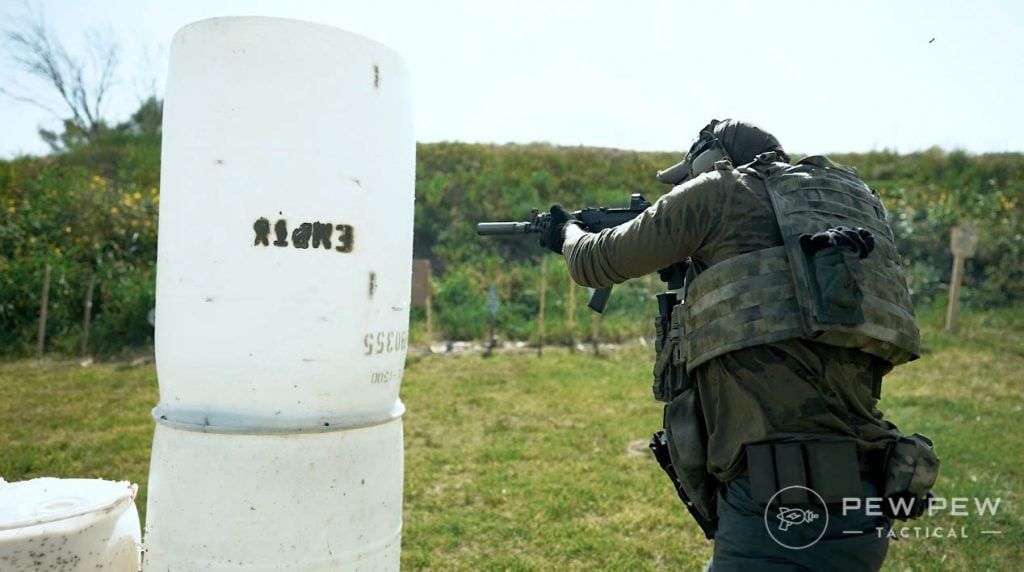
Competition is also a great way to get more time on the range, often with setups that might be difficult or impossible for you to put together on your own.
All you really need to get started are the guns you’ll be shooting, some ammo, and maybe some range bag essentials.
Getting to run around and blast targets, shoot interesting challenges, or master new skills are all exciting and fun.
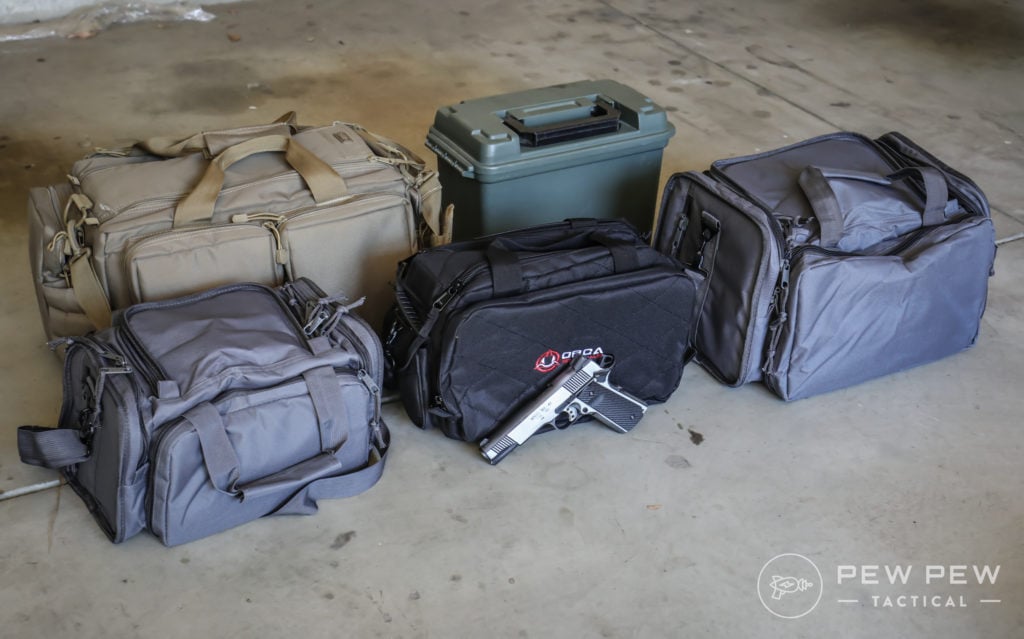
They might not be “real life,” but they can also be a useful way to benchmark your progress over time and against shooters you don’t already know.
In some shooting sports, you can even track how you’re doing directly compared to the very best in the world.
Plus, matches can be fun social events to spend time with people with similar mindsets and interests, whether you just want to hang with new friends or battle for wins in good-natured rivalries.
As for the fame and money the big shooters bring home? Fame might be limited to your local club or the sport you compete in, but the sky’s the limit. Haven’t you heard of Jerry Miculek or Julie Golob?
Pistol Competitions
Handguns are popular for many reasons, including being available at reasonable prices, relatively small and easy to transport and store, and versatile for many different uses.
Best Competition for Glock Owners: The Glock Shooting Sports Foundation (GSSF)
One pistol competition, though, is limited to exactly one brand of gun: GSSF (Glock Shooting Sports Foundation).
GSSF matches are the same across the country and allow people to compete against each other by shooting relatively straightforward and standardized courses of fire that use paper and steel targets.
Winners get Glocks. Sounds pretty good, right?
You do need to already have a Glock to shoot these matches, but nothing else besides magazines and ammunition. That makes them accessible to newer shooters while leaving room for experienced shooters to come and have fun, too.
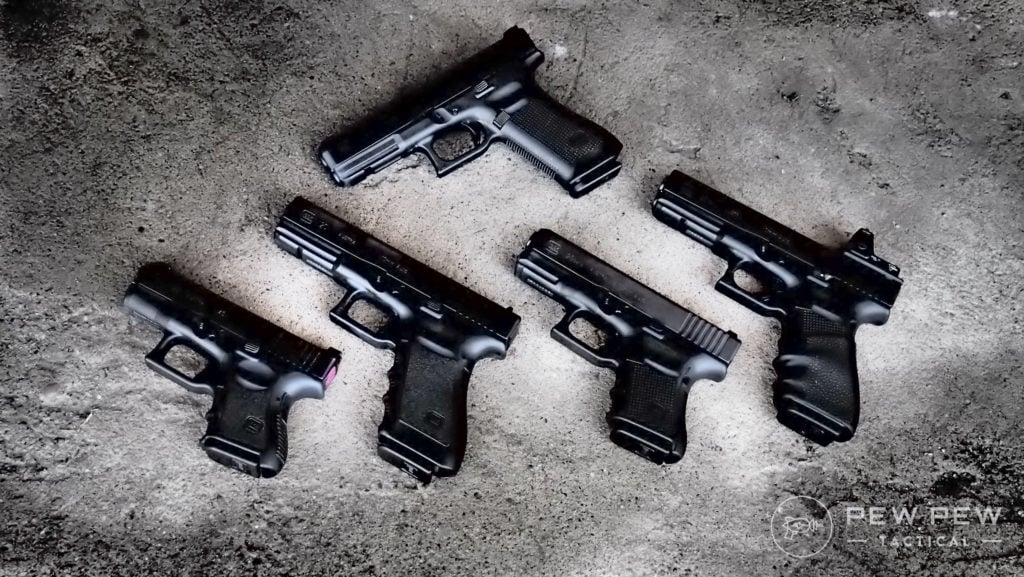
You’ll probably want around 150 rounds per division you intend to shoot, and make sure you bring plenty of extra mags.
Best Competition for .22 LR Pistols: Rimfire Challenge Shooting Associations (RCSA)
Formerly known as the NSSF Rimfire Challenge, the RCSA offers the chance for rimfire pistol aficionados to compete against one another.
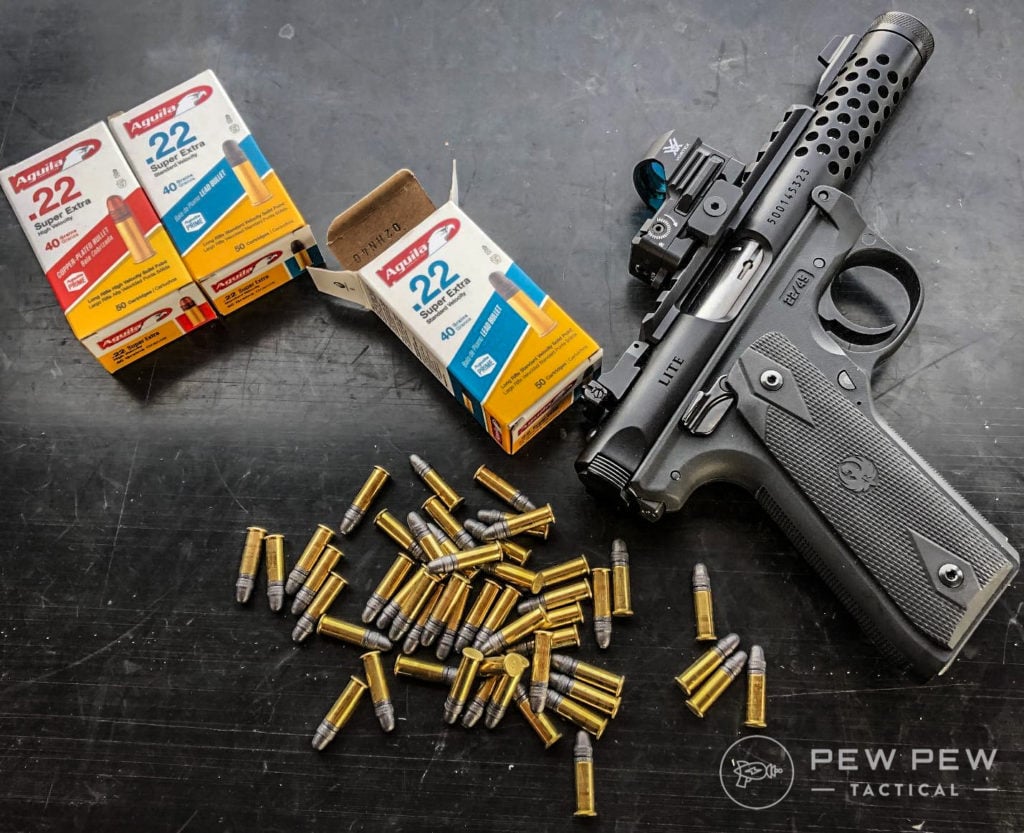
As you might be able to tell from the name, Rimfire Challenge shooters use .22 LR guns to shoot targets — steel, in this case. It’s here under the pistol section because that’s what a lot of competitors use, but .22 LR rifles are welcome, too.
No holsters are required; you just need to be able to shoot five to seven targets at any given stage. The stages can be different from club to club and match to match.
The catch here is that these aren’t pistol-only events. You’ll have to bring both a .22 LR pistol and a .22 LR rifle if you want to compete with these guys.
If you’re interested in Rimfire Challenge, be sure to check out our choice for the best beginner rimfire rifle money can buy.
Best Competition for Beginners – The Steel Challenge Shooting Association (SCSA)
Somewhere in between is Steel Challenge (SCSA).
Almost any kind of pistol, no matter how plain or fancy, can shoot the five stationary steel targets in each Steel Challenge stage. Rimfire and pistol-caliber carbines can also play.
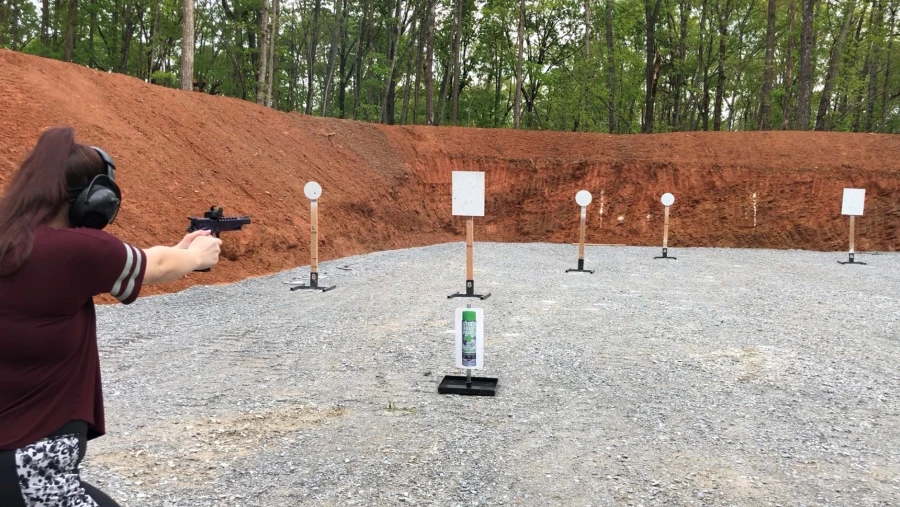
The standard stages are always the same, which leads both to simplicity and familiarity for people just dipping their toes into the sport… resulting in some very fast shooting as competitors learn the most efficient way to shoot the targets.
And similar to GSSF and Rimfire Challenge, all but one Steel Challenge stage is shot from a simple standing position with no movement required.
The stationary shooting at stationary targets makes these contests great for the new shooter looking to improve/test his skills.
If you love the nearly-instant visual and audible feedback of shooting steel but want a little more excitement, there are also “Pro-Am” and “falling steel” matches, almost all of which are shot with centerfire pistols only.
In those, there are many more steel targets with much more variety in shapes and sizes, and they may need to be shot at from different positions in the same stage.
Pro-Am is unique for its limitations on how long a shooter has to shoot as many pieces of steel as they can during a stage.
Falling steel tends instead to be scored by how long it takes the shooter to finish shooting all of the steel available. Either way, you will want to bring 300+ rounds and 5+ magazines to compete.
Best Competitions for Fully Prepped Defensive Pistol Situations – United States Practical Shooting Association (USPSA)
If you’re looking for a competition that will let you maneuver through obstacles to engage your target behind simulated cover, around walls, and through windows, then you’ll love the USPSA.
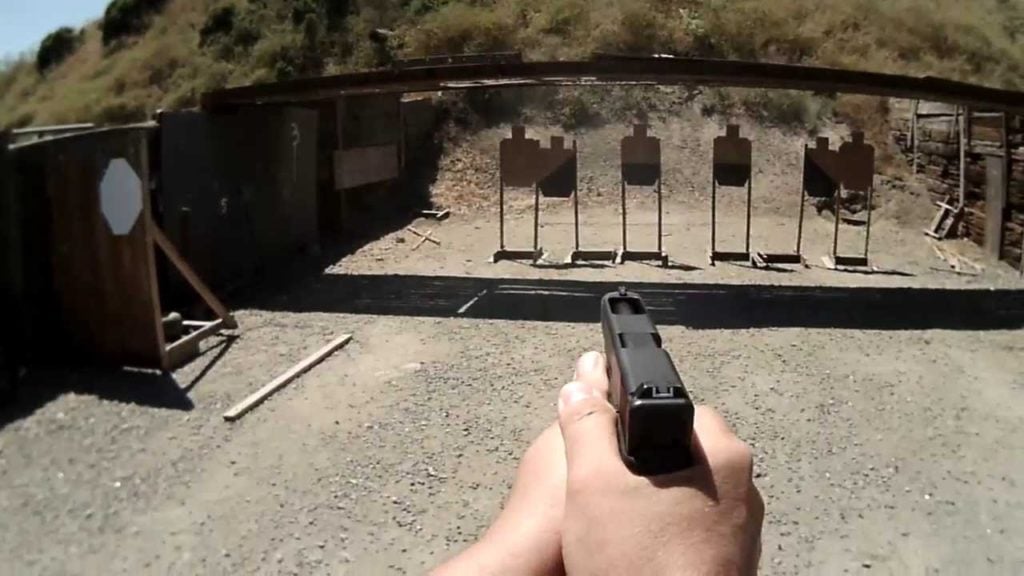
USPSA is a “freestyle” shooting sport with both paper and steel targets, though generally more paper than steel, where shooters compete to see who can shoot stages fastest and with the most accuracy.
To find matches in your area, check out this link here.
It’s most well-known as a pistol sport, but pistol caliber carbines are also starting to become an option there – what guns in particular? See our article about picking USPSA divisions for more.
Best Competition for Real Life Training – International Defensive Pistol Association (IDPA)
Another popular choice for running around with handguns is the matches organized by the IDPA (International Defensive Pistol Association).
These are the guys to work with if you want a competition that will simulate what you would experience as you go about your daily life.
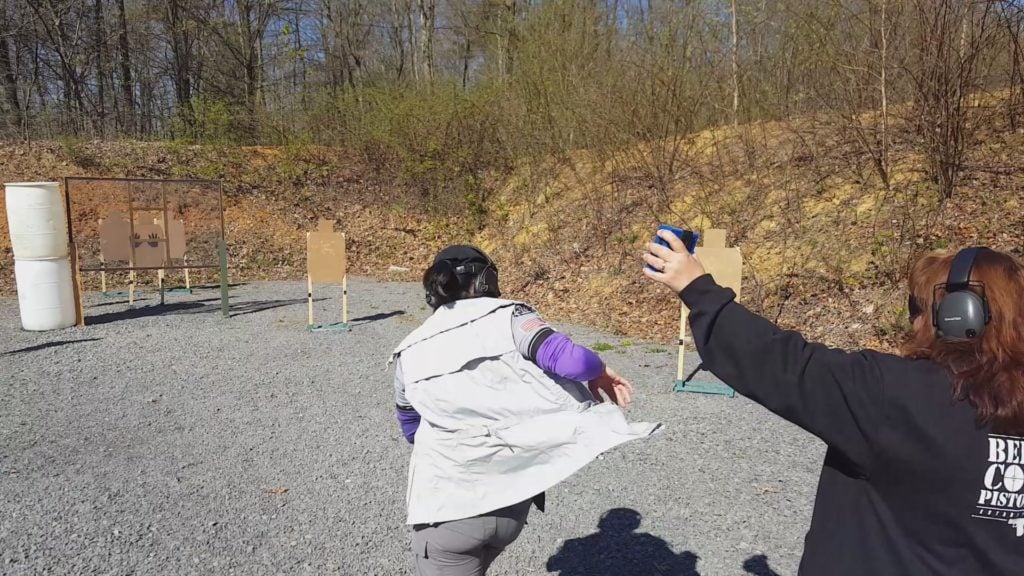
An active shooter scenario transpires while you’re shopping for groceries, and all you have on you is your pistol and a spare mag or two — those are the kinds of situations IDPA simulates.
IDPA is somewhat less freestyle in that it dictates how shooters must engage targets on a stage in an attempt to be more defense-oriented, but it also values the balance of speed and accuracy.
It’s also different from USPSA in that permitted pistols are a bit more limited, and they normally must be carried and drawn from underneath a concealment garment, much like a concealed carry gun in everyday life.
These factors make IDPA attractive to people interested in practicing with the guns they use for self-defense.
Check out our article, Getting Started With IDPA.
Best Competitions for Accuracy Gurus – The National Rifle Association (NRA) Action Pistol Competitions
All of these types of matches tend to be relatively fast-paced, but not all pistol competitions are. One exception is NRA Action Pistol.
This is where the sponsored pros come to play. If you have a tricked-out competition-grade pistol, you’ll like NRA events.
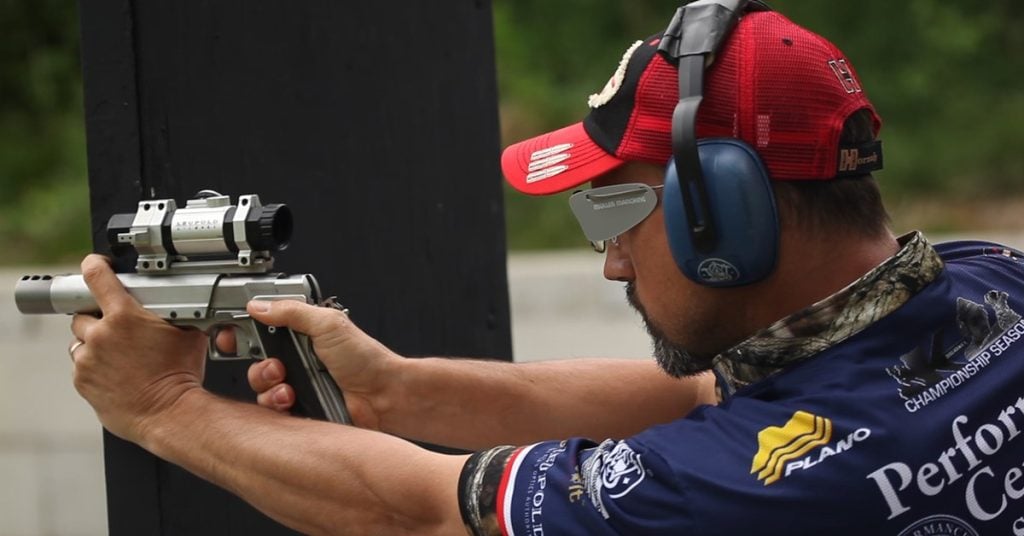
Action Pistol requires shooters to use pistols to shoot round steel plates up to 25 yards away and at paper targets up to 50 yards away.
The highest scoring zone on those paper targets is a circle merely four inches across. The catch?
Well, competitors are given a limited amount of time for the required number of shots, which adds pressure and excitement to the game.
Because each string of fire in Action Pistol is limited to six rounds, it is one of the few pistol sports where revolvers aren’t disadvantaged in any way against semi-automatic handguns.
If this seems up your alley, check out the local competitions here.
Rifle Competitions
Most rifle-only shooting sports are focused on various forms of precision shooting: hitting very small targets or making very tight groups of holes on a target under varying types and levels of challenge.
Rather than focus on the organizations that offer competitions (which we’re still going to mention), we’ll discuss the type of contests you’re likely to see in your area instead.
Best Competitions for Kids: Small Bore Competitions
Perhaps one of the most classic is small bore rifles — rifles in .22 caliber.
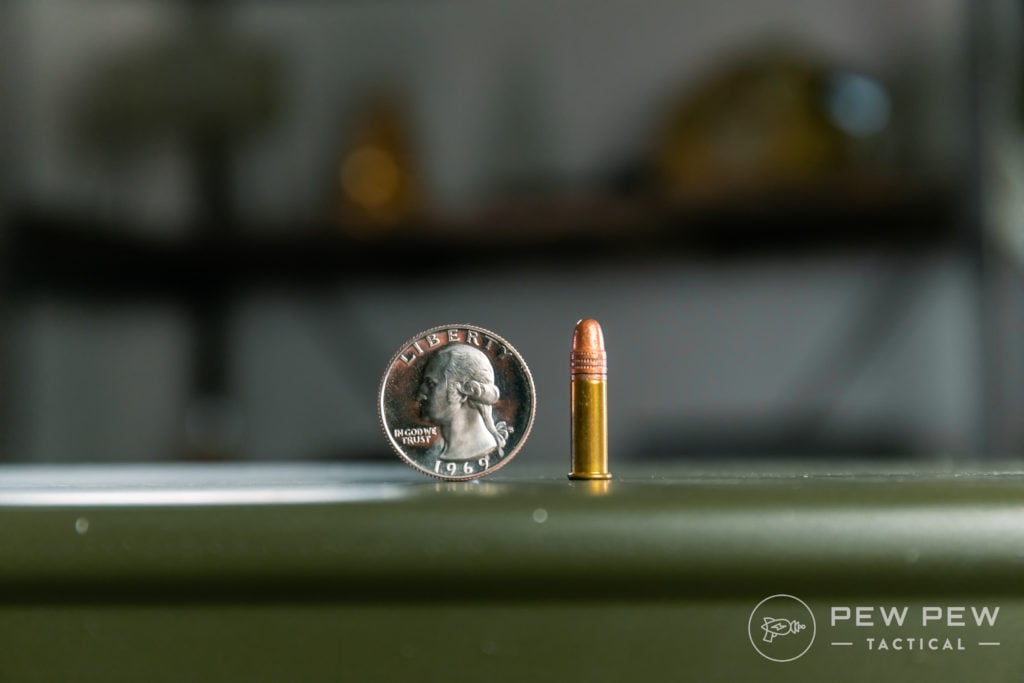
While they can be shot with the .22 LR rifle you got as a kid, high-end competitors use custom rifles that are specially adjusted to precisely fit their bodies from manufacturers like Anschutz, Feinwerkbau, and Walther.
Of course, a heavily modified 10/22 is also a good, cheap(ish) entry point to get you started.
The rifles are normally paired with special canvas or leather shooting coats and pants that help the competitor move as little as possible while shooting. You’ll also see similar equipment in small bore’s close cousin, air rifle competition.
There are several variations of small bore competitions, including ones found at the Olympics.
They are shot from as close as 50 feet and as far out as 100 yards, using either a prone position lying flat on the ground or a combination of prone, sitting or kneeling, and standing positions.
The goal? Hit the middle of the bullseye with every one of the limited shots the competitor is permitted to fire.
While that might not seem so hard with the targets you’ve seen at your local range, the highest-scoring part of the bullseye for an Olympic shooter could be as small as 0.5 millimeters across – less than a quarter of an inch.
If you’re looking for a competition near you, I recommend checking out what the Civilian Marksmanship Program has to offer.
Centerfire Rifle Competitions
If small calibers don’t excite you, but competition shooting at tiny targets do, there are the various NRA High Power and Civilian Marksmanship Program (CMP) rifle competitions, including F-Class and Palma.
The standard High Power match is shot at varying distances out to 600 yards, where the highest scoring part of the target is a 6-inch circle, with long-range F-Class and Palma matches stretching as far as 1000 yards!
As you can imagine, a deep knowledge of ballistics, including how factors like wind can affect a bullet’s travel, becomes increasingly important with these types of competitions.
Some of these matches are shot in a combination of positions, but others only require the competitor to shoot from prone.
The equipment across these types of matches varies quite a bit, from “Service Rifle” all the way to F-Open rifles, with lots of stops in between.
Service Rifles are AR-15 rifles that meet very exacting military-correct specifications with iron sights or limited-power scopes. To help control movement, competitors can wear shooting coats and pants and use a sling, but nothing else.
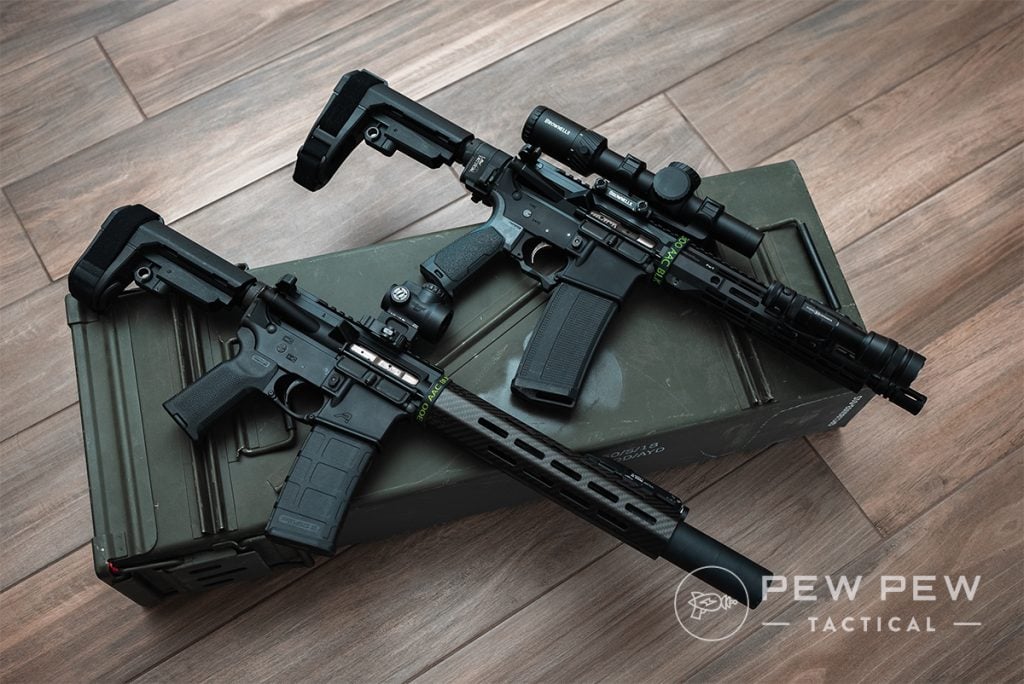
Check out our Beginner’s Guide to Service Rifle Competitions.
At the other end of the spectrum are F-Open rifles, which permit nearly any modification you can imagine to make a rifle easier to shoot more accurately, including bipods and powerful scopes.
Since they shoot at 1,000 yards with the highest-scoring X-ring of the target only 5 inches across, even having all that technology in the gun is no guarantee of high scores, however.
Check out our precision rifle roundup to get an idea of the types of guns you’ll be competing with…and against.
Fortunately, many of the High Power matches can be shot in a division called “Any Rifle” which is, as it sounds, basically any rifle that is able to safely complete the course of fire.
Generally, muzzle brakes aren’t permitted because of their effect on other competitors shooting at the same time, but otherwise, it’s a great place to get started or practice with your gear for other matches.
Interested? Check out our list of great surplus rifles.
Best Competitions for the Hunting Blind Fan: Benchrest Competitions
Benchrest is another area of rifle competition that partially focuses just on making the tiniest groups possible with multiple shots.
Benchrest rifles must be mechanically very accurate and can be fully supported when shot in competition, but the shooter is still responsible for aiming the gun and pressing the trigger.
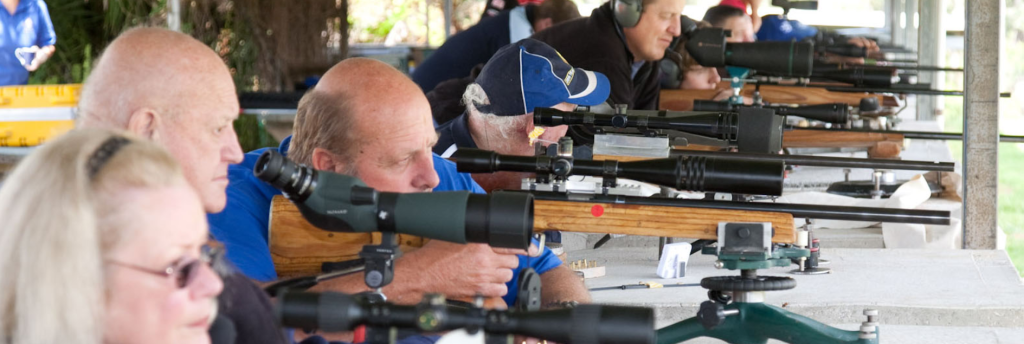
With world record 10-shot groups as small as 0.512 inches across at 300 yards, there’s no margin for error.
In fact, as with High Power, loading ammunition precisely with a load matched to the gun is nearly as important as the actual firearm and shooting itself.
While benchrest, High Power, and small bore are fascinating from the academic aspect of how accurately and precisely a person can shoot a rifle, they can be a little bit boring for some folks.
However, if you’re just getting into the world of competitive shooting and/or are learning the basics of rifle marksmanship, this can be a great place to put your skills to the test.
Best Competitions for Newbies Needing Feedback: Silhouette Competitions
One alternative is silhouette competition shooting.
With divisions for all sorts of firearms — from the types of rifles you’d find in small bore or High Power to hunting rifles to lever action rifles, along with air guns — silhouette is a very inclusive sport.
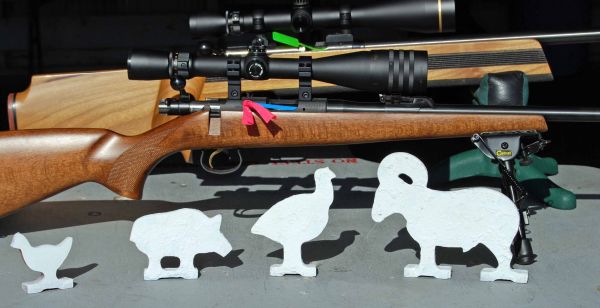
You can even compete with pistols in very similar matches.
It also does not permit the use of many accessories that can be used to enhance accuracy, such as shooting coats and jackets, so it’s a bit more affordable and accessible to get started and not feel like you’re already behind on the equipment race.
The neat thing about silhouette is that competitors shoot while standing up, at metal targets that are shaped as outlines of chickens, pigs, turkeys, and rams.
Each target falls over or is knocked off its stand when successfully hit. The unique targets and instant feedback are more exciting for many shooters than paper bullseye targets.
Check out our article on Silhouette Shooting for Newbies!
Best Competition for Long-Range Work: Precision Rifle Series
Even more fast-paced and with much more variation are precision long-range matches that fall under the umbrella of the Precision Rifle Series and similar organizations.
These matches are primarily for centerfire rifles, both bolt-action and semi-automatic, although there are also rimfire versions popping up.
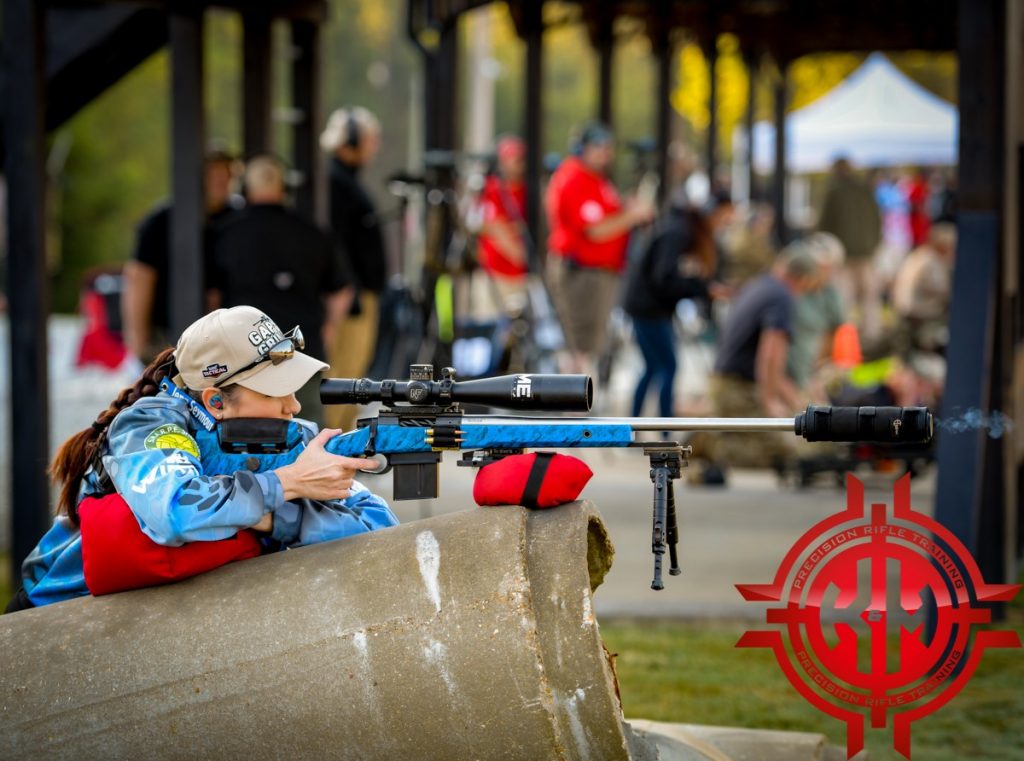
In addition to the rifles themselves, shooters are often permitted to use bipods or stuffed shooting bags as supports, but not special clothing, and they may be restricted as to how many extras they can use in various parts of the match.
Instead of shooting from standard standing, kneeling, seated, or prone positions all the time, precision rifle matches can require shooters to run around, move objects, and use props like simulated rooftops or vehicles as supports for their rifles.
Competitors may be permitted to fire as many rounds as they can during a limited period of time, be limited only by the number of rounds allowed to be shot, or some combination of the two.
Precision Rifle can involve targets that can be as simple as steel plates or spinners that must be shot so that the bottom plate flips over the top — a challenge of both accuracy and timing.
It differs from the other rifle competitions described because targets may be placed at varying distances that may or may not be known by the competitor before the match.
You can find out more in our guide to Precision Rifle Competition for Beginners.
Shotgun Games
Much as with rifles, there are essentially two types of shotgun competitions: the traditional sports and the newer action/tactical sports.
Best Competitions for Fans of “Duck Hunt”: Traditional
Traditional shotgun sports are the ones many people have heard of: trap, skeet, and sporting clays.
They involve shooting clay disks, called pigeons, which are launched into the air or across the ground by special machines known as traps.
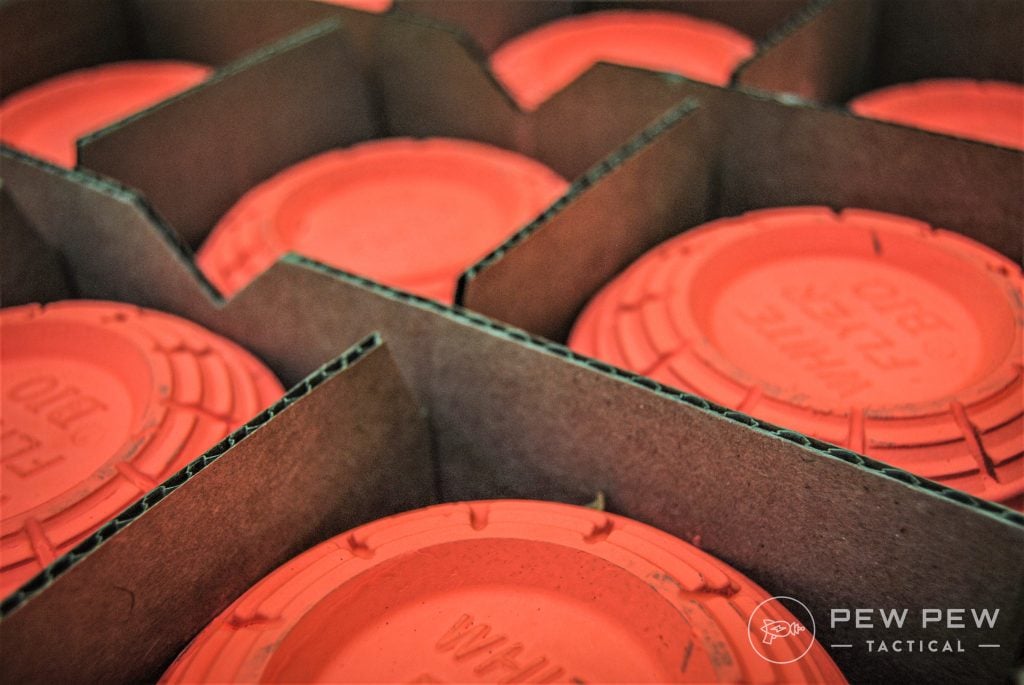
Most require competitors to shoot at 25, 50, or 100 targets in any given match, making them relatively affordable from an ammunition and time perspective.
A successful hit on target means that the shotgun pellets fired cause the entire pigeon to shatter in a cloud of dust, though even a small piece of the target being broken off by the pellets is also counted as a hit.
These sports differ largely in how the targets are presented to the shooter. In trap, the pigeons are generally thrown out and away from where the shooter stands.
With skeet, they move across the field in front of the shooter. Both are very regimented: competitors can expect to stand in the same place and see clay targets presented at the same trajectory and speed almost anywhere in the world.
The details change between the different variations of each, such as with double trap, Olympic/international trap, English skeet, and helice (a weird, spinning skeet with wings).
Because target presentation is consistent in trap and skeet, the challenge becomes being able to break every clay every time.
This becomes even harder not only with wind catching a clay and making it move erratically, but with the pressure of getting to number 20 or 23 and wanting to make it a perfect round of 25 targets hit in a row.
Sporting clays is something else altogether. With that, every sporting clays club or event can have its own unique set of target presentations.
Some clays may be thrown outwards as in trap or across as in skeet, but they might also be rolled on the ground or tossed straight up, all to simulate various types of small game that might be hunted with a shotgun.
Many sporting clays courses take advantage of their natural settings and incorporate trees, ponds, or even abandoned buildings into their challenges.
All of the traditional shotgun sports can be shot with almost any type of shotgun, but the over/under is the most classic.
Most are 12 gauge, but certain shotgun sports also require or allow the use of 20 gauge, 28 gauge, and .410 bore guns.
Pump and semi-automatic shotguns are also found in competitors’ hands, so don’t feel like you can’t get started unless you buy an over/under first. Unless you want an excuse to go gun shopping, of course.
If so, our best shotguns for bird hunting will also serve you well when hunting simulated game.
Tactical/Action
On the complete opposite end are the tactical/action shotgun competitions.
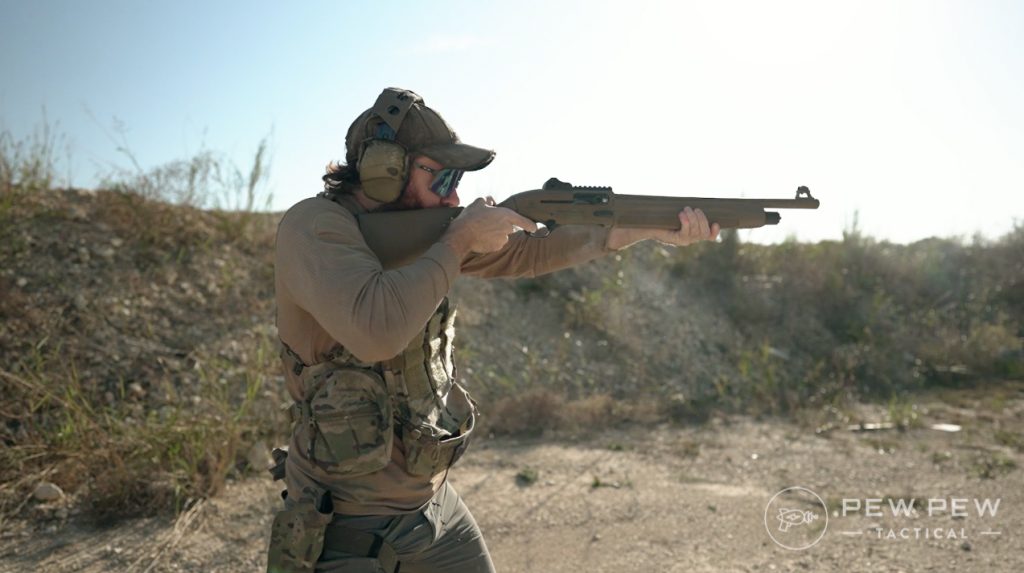
Much like the action pistol or precision long-range rifle matches described earlier, these types of competitions are about running and gunning.
Targets can include steel plates to be knocked over, stationary clay targets, flying clay targets, and sometimes even cardboard targets.
That’s because these types of competitions don’t just use birdshot but also buckshot and slug ammunition.
Tactical/action shotgun matches aren’t just about the shooting…they’re also about dealing with both the quantity and variety of shotshells that may be needed for a particular stage.
Because loading is “on the clock,” competitors in this discipline have come up with several creative ways to carry ammunition and make it ready to load into the gun efficiently, sometimes two or four shells at a time.
These shell carriers aren’t required for a match, but are part of the gear needed at higher levels of competition.
That also means the guns themselves are often modified so that they are easier to load and can hold more shells at once.
Tubular magazines are often extended, and their loading ports are widened so that it is easier for the competitor to shove shells into them quickly.
Additionally, some sort of sighting system beyond the bead or rib may be added for increased accuracy on static targets, and controls are made larger so that they are easier to operate at speed.
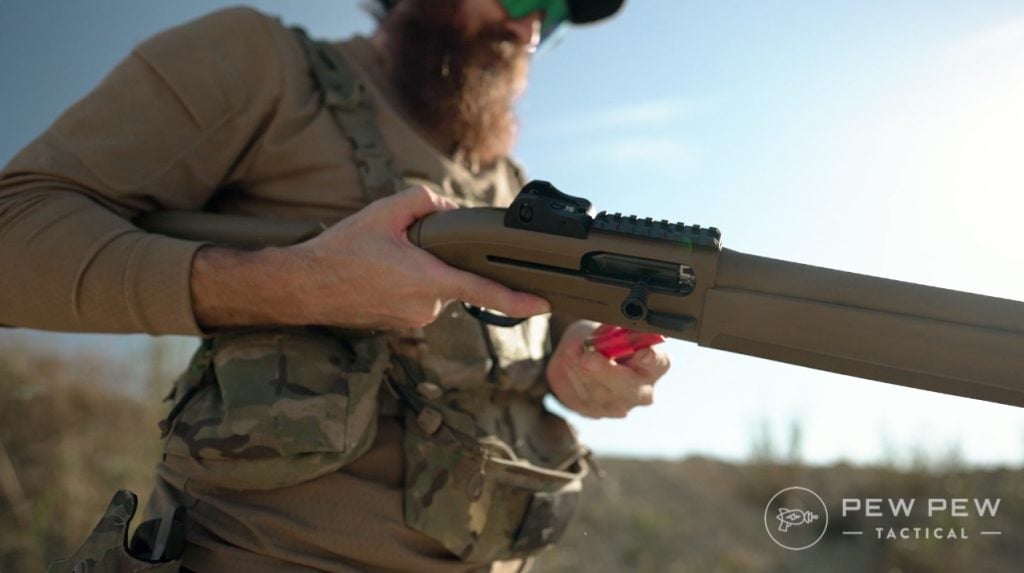
However, one of the biggest issues for all guns in these matches is reliability, and ensuring that the shotgun doesn’t stop working in the middle of a stage is part of the challenge of tactical/action shotgun.
Multigun Competitions: More Guns, More Fun
As you can see, there are plenty of sports where you can show up with one of your favorite guns and have fun and improve with it. But if one gun is good, are two or three guns better? They can be!
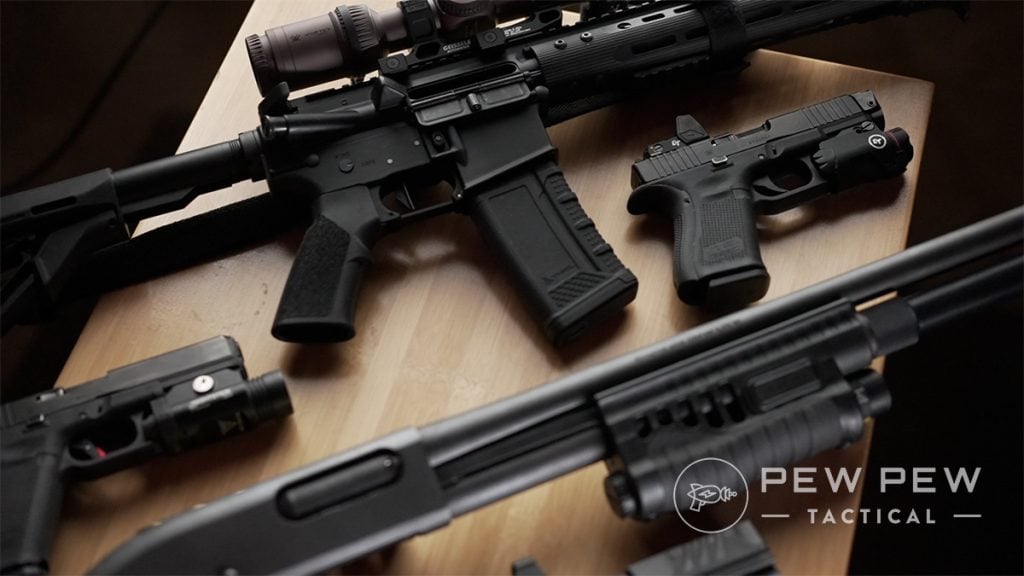
While 3-gun (pistol, rifle, and shotgun) – is the most common, there are also 2-gun matches using various gun combinations.
The largest rule sets for modern multigun are 3-Gun Nation and USPSA Multigun, but there are also many other rules used at local ranges or that are particular to a single large match or group of matches.
Besides having to learn each of the guns involved, multigun also adds the complexity of learning to switch between the guns on the fly.
Stages may also be designed so that competitors need to decide what gun they want to use to shoot at different targets, so it can be more difficult to plan the best way to shoot the stage for an individual shooter and to remember the plan when actually competing.
Remember, there is more than just guns required here, so check out our article on Essential 3 Gun Gear.
Cowboy Action Shooting: A Blast from the Past
Multigun isn’t just limited to modern guns.
Cowboy Action Shooting (also known as SASS or Single Action Shooting Sports) uses single-action revolvers, pump shotguns, and lever-action rifles.
They have some of the largest organized competition shooting matches in the United States, including a relatively large proportion of women and juniors.
Unlike every other type of competition mentioned so far, all competitors are also required to select an Old West-style name that is used at matches and when reporting scores, and they must dress in period-appropriate clothing.
Yes, Cowboy Action Shooting is part costume party and part shooting competition, and by all accounts – all fun.
You can find matches in your area here.
Final Thoughts
This is not necessarily a sweeping flyover of the many competitive shooting disciplines that are available.
There are so many shooting sports available that it would be impossible to list them all, but I’ve hopefully given you a flavor of the many ways that shooters have found to test and improve their skills against themselves and others.
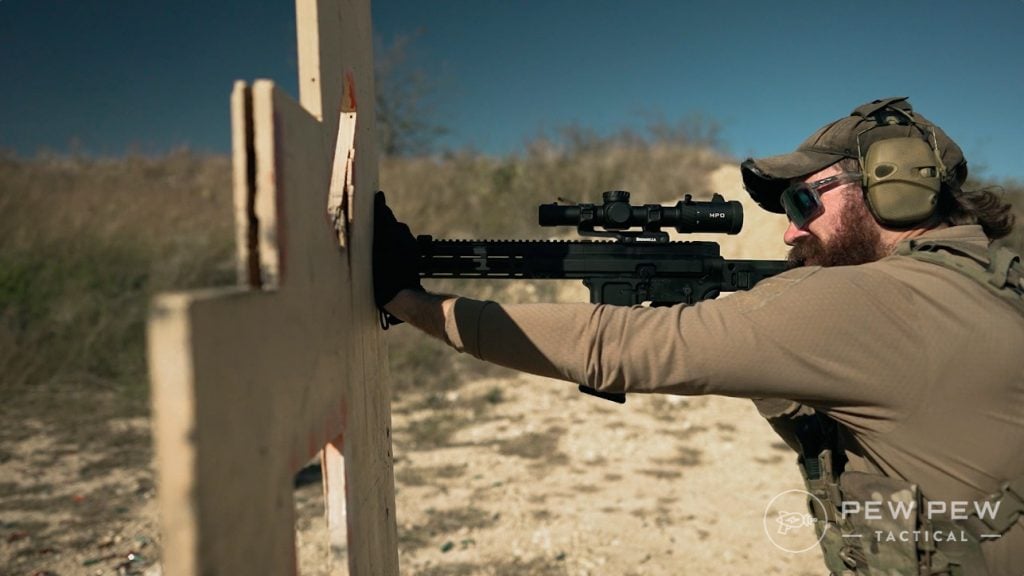
If you’re already a competitor and I’ve missed your sport, tell us about it below! Remember, practicing doesn’t always mean hitting the range — check out our article on Dry Fire Practice for Competition Shooters!

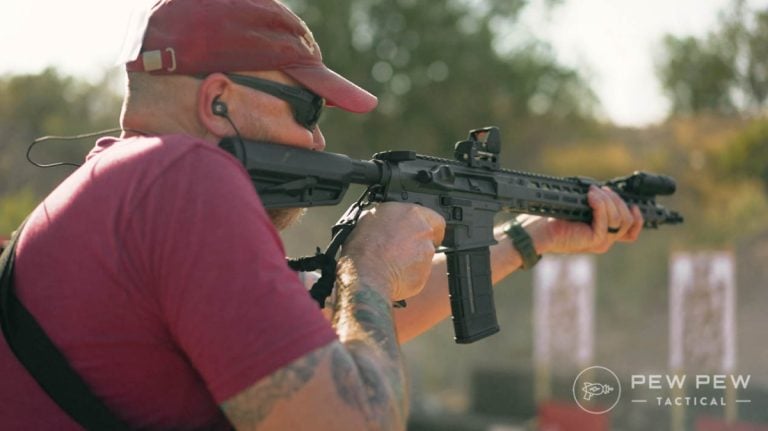
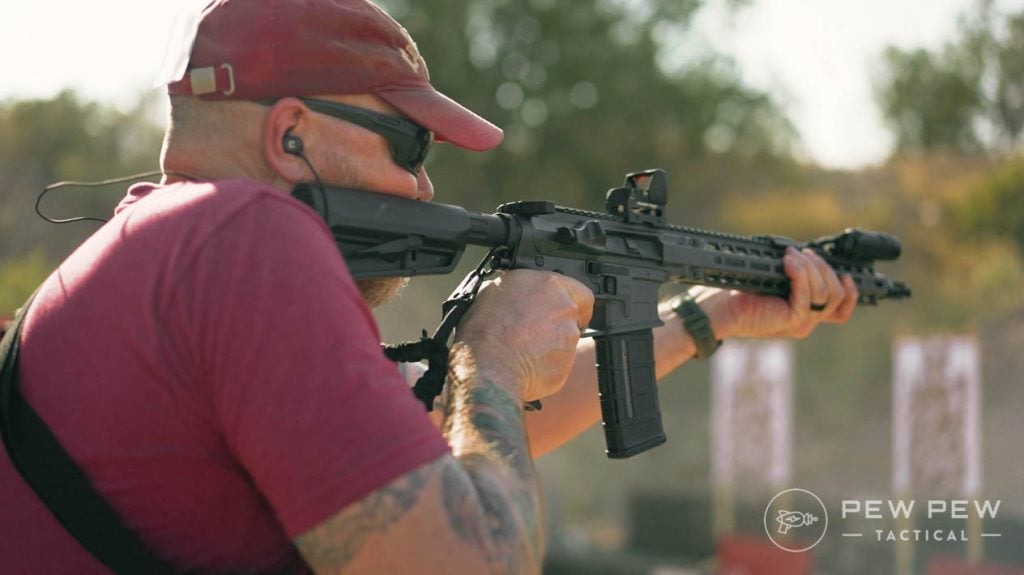







9 Leave a Reply
I observed a couple of matches and it really was not the "friendly" environment that everyone talks about. Build a better mousetrap, spend as money as humanly possible. It really did not seem enjoyable. I can hit a man-sized target between the forehead and navel at 25 meters, but I cannot shoot the buttons off of his shirt. I just do not have the time and money to get good enough to NOT take a beating in competition.
I just retired and would like to shoot competitively. I am a beginner , so lots learn . I’m located in Lexington , SC . Any assistance finding a team or group would be greatly appreciated
I went to a range to observe a few stages of a match, and it wasn't what I had hoped for. Only two out of thirty people shooting production, and everyone else in the "spend as much money as possible" divisions. It wasn't great.
Thank you for the breakdown of the different competitions. Earlier this year some friends and I went to look into competitions in SLC Utah.
They seem to be difficult to find at times. But at the public range Lee Kay there were a few going on that weekend.
I have to say, I was not interested in Western Style at all until we checked it out. They happened to be out there with USPSA. The Western Shooting group was probably the most fun and laid back group.
I wish CAS would offer a division or a group that didn't require dressing up and such. I would love to shoot it, but I refuse to LARP while doing it. That said, the people in the community are great from what I've seen. The clubs are very friendly and a good time to be around. The speed-draw people hold some of their larger matches in the parking lot of my BassPro since they are only shooting wax bullets, it's always a good time to see them.
Thinking of buying a Sig MPX pistol 8" barrel; are there any competitions that allow that, with or without a stock?
Yes! Now there's a tough sport combining excellent aerobic fitness with precision shooting. One neat thing is that while Biathlon is a Winter Olympic sport because of the cross-country skiing, there's also a summer version with cross-country running combined with shooting. Is that something you've tried?
Well, if you can ride horses that jump, fence one-touch epee and swim 200 meters you can dabble in Modern Pentathlon.
Ever hear of Olympic Biathlon?